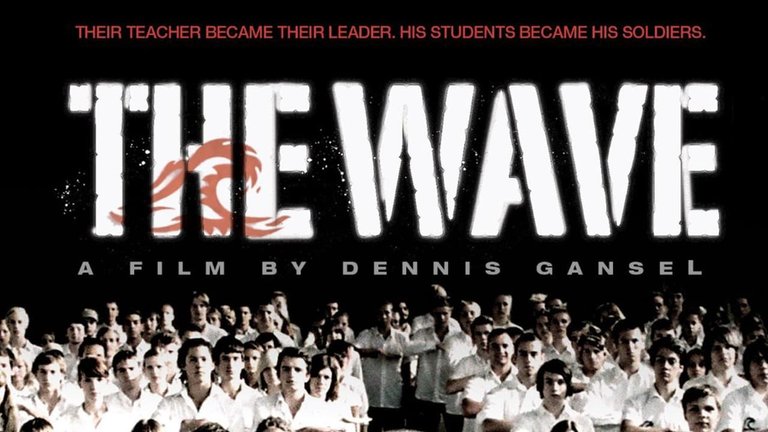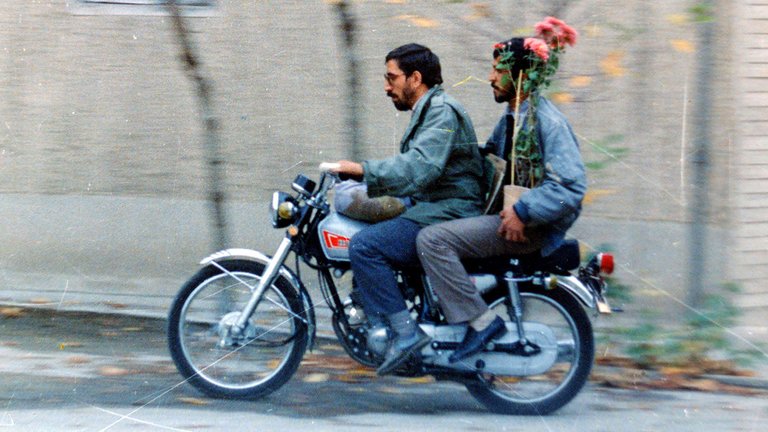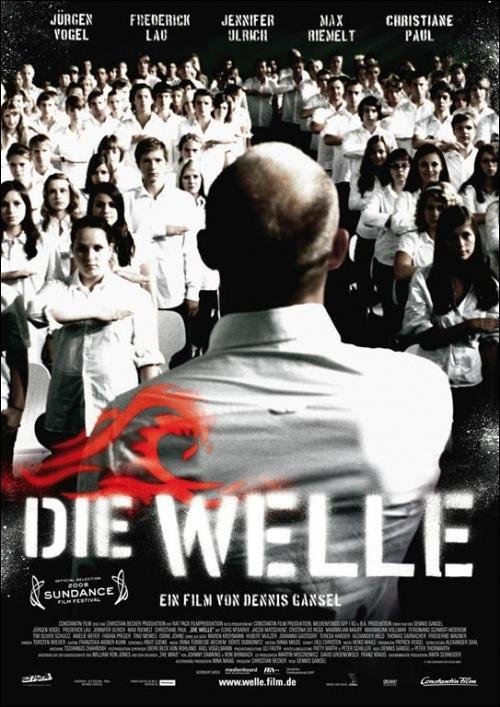The Wave (2008): Have we learned the lesson? | ¿hemos aprendido la lección?

Basada en la novela de Todd Strasser
Last week I published a review of American History X, a story from the 1990s, set in the US and related to skinheads and neo-Nazi groups. Obviously when I saw that movie I remembered that there was another one with a similar theme, called The Wave and by chance I came across a copy of the novel on which it is based, so after reading the book for a couple of days, I was finally able to see the movie I'm going to talk about today.
La semana pasada publiqué una reseña de American History X, una historia de los años noventa, ambientada en los EEUU y relacionada con los skinheads y los grupos neo nazis. Obviamente al ver aquella película recordé que existía otra de temática parecida, llamada The Wave y por cosas del azar di con un ejemplar de la novela en la que está basada, así que después de leerme el libro en un par de días, finalmente pude ver la película de la cual les hablaré hoy.
Die Welle (The Wave) is a 2008 German film, directed and co-written by Dennis Gansel, based on the novel of the same name by American writer Todd Strasser, which in turn is based on true events. Let's go in order: at the end of the sixties, Ron Jones, the history teacher at Cubberley High School, an institute in Palo Alto, California, carried out a social experiment in the classroom. The purpose of the experiment was to try to explain how non-Nazi German citizens allowed so much abuse to take place right under their noses. Through some exercises and instructions, the teacher was shaping the behavior of the group until they became a cohesive unit that almost completely annulled individuality and adopted a collective identity in just five days (!). Before things got any further, Jones called off the experiment and showed his students how they themselves had become a small society that did not think for itself and despite what they had said before, it was still possible that groups like the Nazis managed to seize power before the inert gaze of their peers. Based on that experience, Todd Strasser wrote the novel that he published in 1981. And based on that novel, Dennis Gansel co-wrote the screenplay and directed what is considered one of the greatest German films of all time.
Die Welle (The Wave) es una película alemana de 2008, dirigida y co escrita por Dennis Gansel, basada en la novela del mismo nombre del escritor norteamericano Todd Strasser, que a su vez está basada en hechos reales. Vamos en orden: ai final de los años sesenta, Ron Jones el profesor de historia de la Cubberley High School, un instituto de Palo Alto, California, llevó a cabo un experimento social dentro del aula de clases. El propósito del experimento era tratar de explicar cómo los ciudadanos alemanes que no eran nazis permitieron que se cometieran tantos abusos en frente de sus narices. A través de algunos ejercicios y consignas, el profesor fue moldeando el comportamiento del grupo hasta que se convirtieron en una unidad cohesionada que anuló casi por completo la individualidad y adoptó una identidad colectiva en apenas cinco días (!). Antes de que las cosas llegaran más lejos, Jones dio por terminado el experimento y les mostró a sus alumnos cómo ellos mismos se habían convertido en una pequeña sociedad que no pensaba por sí misma y que a pesar de lo que hubieran dicho antes, aún era posible que grupos como los nazis consiguieran hacerse con el poder ante la mirada inerte de sus pares. Basándose en esa experiencia, Todd Strasser escribió la novela que publicó en 1981. Y basándose en esa novela, Dennis Gansel co escribió el guión y dirigió la que se considera una de las mejores películas alemanas de todos los tiempos.

Logically, adapting a story that took place in California in the sixties to the Germany of the 21st century involved making some changes. Most of them were superficial and in form (names of the characters, the educational framework, changing football for water polo), but others were fundamental: studying the Nazi autocracy in the US is not the same as doing it in Germany, obviously. This change of scenery enriches the drama because it allows us to reflect on that historical responsibility of the German people and that feeling of guilt that, generations after the war, continued to hover over German youth, as seen in the novel The Reader by Bernhard Schlink.
Lógicamente, adaptar una historia ocurrida en la California de los años sesenta a la Alemania del siglo XXI implicó hacer algunos cambios. La mayoría fueron superficiales y de forma (nombres de los personajes, el marco educativo, cambiar el football por el polo acuático), pero otras de fondo: no es lo mismo estudiar la autocracia nazi en EEUU que hacerlo en Alemania, obviamente. Este cambio de escenario enriquece el drama porque permite reflexionar sobre esa responsabilidad histórica del pueblo alemán y ese sentimiento de culpa que, generaciones después de la guerra, seguía flotando sobre la juventud germana, tal como se ve en la novela El lector de Bernhard Schlink.
In addition, the German adaptation uses current cultural elements (that is, from the time of the film) and although the central message remains the same, it makes it more relevant. The slogans (such as Discipline is strength), the logo of the movement, its name, taking action, all of this is also in the novel, but I think the film turns The Wave into something more collective, while in the book seems to be almost entirely directed by the teacher. It is very interesting to see how the original intentions of a project can be misrepresented and how an experiment can get out of our control. In the novel, Strasser writes "You cannot experiment with human beings" and it is true that despite being manipulative, human beings are also unpredictable, that's why I liked the ending in the movie much more than in the book, although the one in the book is more faithful to the real story. It is what constitutes one of the most interesting paradoxes I have seen in stories like this, the end of the novel, despite having been written by an American, is more German, with that talk and what is shown on the screen to the students; while the end of the German film is more American, but I won't reveal anything about this one so as not to spoil the surprise for you.
Además, la adaptación alemana utiliza elementos culturales actuales (o sea de la época de la película) y aunque el mensaje central siga siendo el mismo, lo dota de mayor vigencia. Las consignas (como La disciplina hace la fuerza), el logo del movimiento, su nombre, el pasar a la acción, todo eso está también en la novela, pero creo que la película convierte a La Ola en algo más colectivo, mientras que en el libro parece ser casi por completo direccionado por el profesor. Es muy interesante ver cómo se pueden tergiversar las intenciones originales de un proyecto y cómo un experimento se puede salir de nuestro control. En la novela, Strasser escribe "No se puede experimentar con seres humanos" y es cierto que a pesar de ser manipulabes, los seres humanos también son impredecibles, por eso me gustó mucho más el final en la película que en el libro, aunque el del libro sea más fiel a la historia real. Es lo que constituye una de las paradojas más interesantes que he visto en historias como esta, el final de la novela, a pesar de haber sido escrito por un estadounidense, es más alemán, con esa charla y lo que se muestra en pantalla a los alumnos; mientras que el final de la película alemana es más americano, pero de este no revelaré nada para no arruinarles la sorpresa.

For that reason, although I usually recommend reading the book first and then watching the movie, I think that in this case it is not necessary, and actually I do not recommend it. For once, the film is superior: it's more dramatic, there's more tension, the climax hits harder, and the fact that German students are reflecting on these types of issues gives extra points to reflections on identity, social justice and historical responsibility, among others. There is a phrase that I heard years ago that says History repeats itself if one allows it and this and other sentences seem to suggest that history always looks for a way to happen again, but in cases such as autocratic systems, fascism, Nazism, and any other regime that systematically violates human rights and crushes our human dignity, I hope that one day we will learn the lesson. It does not seem very likely, it is true, because wars, theocratic systems, dictatorships still exist, but I think that reviewing stories like this and reflecting on these issues helps to narrow the social cracks through which the disastrous ideals that sustain those systems may emerge, how many of you have seen The Wave? Do you think it is possible that today, in the middle of 2023, there can be a society that embraces the ideals of an autocratic system or perhaps as a species and as a global village we have already overcome all that? I read you in the comments.
Por esa razón, aunque normalmente recomiendo leer primero el libro y después ver la película, creo que en este caso no sólo no hace falta sino que no lo recomiendo. Por una vez, la película es superior: es más dramática, hay mayor tensión, el clímax golpea más fuerte y el hecho de que sean estudiantes alemanes los que reflexionan sobre este tipo de temas le da puntos extras a las reflexiones sobre identidad, justicia social y responsabilidad histórica, entre otros. Hay una frase que escuché hace años que dice La historia se repite si uno lo permite y esta y otras sentencias parecen sugerir que la historia siempre busca la forma de volver a suceder, pero en casos como los sistemas autocráticos, el fascismo, el nazismo, y cualquier otro régimen que sistemáticamente viole derechos humanos y aplaste nuestra dignidad humana, espero que algún día aprendamos la lección. No parece muy probable, es cierto, porque aún existen las guerras, los sistemas teocráticos, las dictaduras, pero creo que revisar historias como esta y reflexionar sobre estos temas ayuda a estrechar las grietas sociales por las cuales podrían colarse los nefastos ideales que sustentan esos sistemas, ¿cuántos de ustedes han visto The Wave? ¿creen posible que hoy, en pleno 2023, pueda existir una sociedad que abrace los ideales de un sistema autocrático o acaso como especie y como aldea global ya hemos superado todo eso? Los leo en los comentarios.
Reviewed by | Reseñado por @cristiancaicedo
Other posts that may interest you | Otros posts que pueden interesarte:
  |
|---|



El mensaje es muy bueno. Concuerdo con la frase de que los seres humanos somos impredecibles. Quizas dentro del entorno la mayoria pierda la forma de razonar, pero siempre habrá uno que piense lo contrario.
Esta película parece ser un fascinante recordatorio de cómo la historia puede repetirse si no aprendemos de ella. Es interesante la reflexión que presenta sobre la identidad, la responsabilidad histórica y la manipulación de masas. Y mucho más interesante aún las concesiones que se han tomado para hacer la película, ya que ofrece una experiencia más impactante y vigente, destacando la importancia de evitar que la historia se repita.
Sí, realmente me pareció una buena adaptación y actualización del mensaje de la obra original. Se la recomiendo. Saludos
Primero lo primero, esta película se ve tentadora porque nos invita a reflexionar sobre muchas cosas y eso la hace valiosa, claro eso si tenemos una mente crítica, hoy en día tristemente hay mucho cabeza hueca.
Por otro lado, yo soy de hacerlo, al revés veo primero la película y luego leo el libro, la razón es que el nivel de descripción de un libro es muy difícil de alcanzar en la pantalla y entonces para no decepcionarme hago eso.
Tercero, creo que todos los sistemas hasta la democracia son capaces de vulnerar y violar derechos humanos, obviamente, esto es más descarado y notorio en presencia de un régimen autoritario o una dictadura.
Sí, es una película que nos hace reflexionar, sin duda, y efecivamente cualquier sistema de gobierno tiene sus vicios, algunos más y otros menos, pero como dice la sentencia "El poder corrompe". Saludos y gracias por leerme.
¡Enhorabuena!
✅ Has hecho un buen trabajo, por lo cual tu publicación ha sido valorada y ha recibido el apoyo de parte de CHESS BROTHERS ♔ 💪
♟ Te invitamos a usar nuestra etiqueta #chessbrothers y a que aprendas más sobre nosotros.
♟♟ También puedes contactarnos en nuestro servidor de Discord y promocionar allí tus publicaciones.
♟♟♟ Considera unirte a nuestro trail de curación para que trabajemos en equipo y recibas recompensas automáticamente.
♞♟ Echa un vistazo a nuestra cuenta @chessbrotherspro para que te informes sobre el proceso de curación llevado a diario por nuestro equipo.
🥇 Si quieres obtener ganancias con tu delegacion de HP y apoyar a nuestro proyecto, te invitamos a unirte al plan Master Investor. Aquí puedes aprender cómo hacerlo.
Cordialmente
El equipo de CHESS BROTHERS